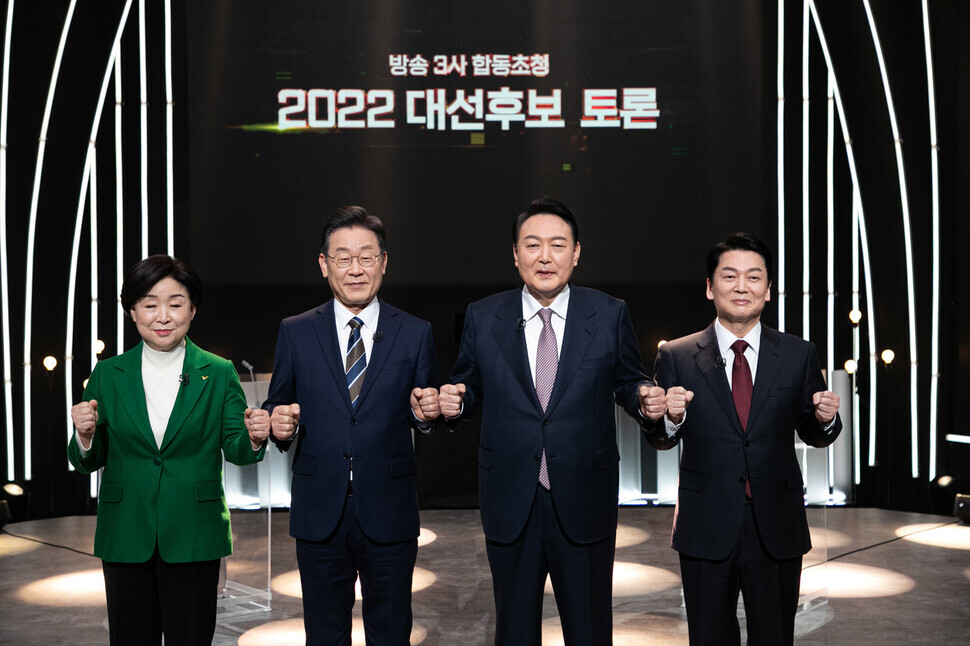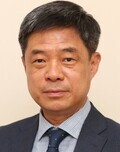hankyoreh
Links to other country sites 다른 나라 사이트 링크
[Column] Worrying prospects for diplomacy and security in the race for the Blue House


In an election climate marked by unilateral pledges and negative campaigning, the fourth televised debate last week was an opportunity to get at least a little bit of a sense of the four participating candidates’ governing capabilities.
The assessments that followed were generally self-serving, but the one I found most disappointing at a personal level concerned the field of foreign affairs and national security.
The 30-minute debate on foreign affairs and national security was woefully inadequate in terms of time, form and content. Out of the four topics of the debate, it was the one where all the candidates showed their weakest performance.
There was no hint of a long-term vision for foreign affairs or coherency in the details. I was left with the feeling that foreign affairs and national security will turn out to be one of the big risks for the next administration, regardless of who ends up in the Blue House.
I was particularly concerned by the debate responses from People Power Party (PPP) candidate Yoon Suk-yeol. Not only did they leave me confused as to whether he was speaking for himself or rattling off what others had written for him, but it all just sounded like empty sloganeering. Considering that he is the top opposition candidate and in close contention for the highest popular support, his ideas were terribly crude.
In simple terms, Yoon declared his plan to ruffle China’s feathers with additional Terminal High Altitude Area Defense, or THAAD, anti-missile system deployment, to upset North Korea with warnings of “preemptive strikes,” and to get on well with the US.
This approach is neither realistic nor desirable. I can’t say anything about prioritizing the US alliance, but it doesn’t warrant South Korea actively getting into button-pushing and finger-wagging with Beijing and Pyongyang.
A bigger question is what lies behind the pledges posted on his Facebook page, including the ones about adding a THAAD deployment. We need to know if this is a reflection of Yoon’s own conclusions about foreign affairs and national security, or the kind of cheap security populism we’ve come to expect from PPP leader Lee Jun-seok. In other words, is Yoon surrounding himself with PPP hard-liners and selling himself as the “security candidate”?
There’s a world of difference between showing that you’ve done your homework in a debate and actually having what it takes to handle foreign affairs and national security matters as president.
As Kim Chong-in said, it may win Yoon some support points to perform according to the script someone else wrote for him, but it’s the definition of penny-wise and pound-foolish. It’s tough to meet the South Korean public’s standards with questionably feasible far-right security policies shared over a single debate.
Democratic Party nominee Lee Jae-myung also failed to live up to expectations.
When he was asked how he planned to meet with the leaders of the US, China, Japan and North Korea if he becomes president, his response — stressing the importance of “practical diplomacy” and saying he would “decide when that time comes” — was quite unsatisfactory. The banalities might have fit more with reality if he had added something like, “Realistically, I think I’ll probably meet first with Joe Biden.”
Instead, you have to ask how much thought Lee is giving to the prescriptive nature of the South Korea-US alliance.
In addition to being a foundation of South Korea’s economy and natural security, the alliance is also a partnership in terms of values of liberty, human rights and democracy. This means he needs to be thinking about a forward-looking alliance that is closely aligned with reality, rather than the same stale attitude of simply following Washington’s bidding.
In contrast with other areas, Lee kept repeating the same generalities about “practical” and “balanced” diplomacy. It left the impression that in comparison with the economy or livelihoods, he is relatively underprepared when it comes to foreign affairs and national security.
Minor opposition People’s Party candidate Ahn Cheol-soo continued flirting with the right wing, but he seemed to have been unable to show what sets him apart.
In terms of abandoning the “three noes” concerning THAAD and reaching a nuclear sharing agreement with the US, he showed a conservative stance. But in focusing so much on things like the next-generation fighter aircraft project, he failed to offer a comprehensive picture in the realm of foreign affairs and national security.
Justice Party candidate Sim Sang-jung showed clarity of convictions and was relatively strong on detail. Indeed, this was the area where she really stood out from the rest.
She was quite incisive in her remarks on things like the irrationality of additional THAAD deployment. But she too failed to share her own concrete picture for peace-oriented diplomacy.
We can expect the North Korean nuclear issue to become even more turbulent during the next administration, which raises the likelihood that it will find itself at the crossroads between antagonism and compromise. It’s a moment that calls for a capable leader.
A look at the leaders of South Korea’s neighbors only raises further concerns. All of them are quite experienced: there’s Biden, a veteran in the area of foreign affairs; Chinese President Xi Jinping, who has been in power for nine years and is poised to rule for much longer; and Japanese Prime Minister Fumio Kishida, a former minister of foreign affairs. Even North Korean leader Kim Jong-un has been in power for over a decade.
To them, any one of the candidates is likely to come across as wet behind the ears.
It’s been Korea’s misfortune that no “foreign affairs presidents” have come along since Kim Dae-jung.
It’s concerning to think that none of the candidates in this election looks like they’re going to be a proper president when it comes to foreign affairs. Hopefully, my concerns will prove unwarranted.
If you can’t practice solid diplomacy, any talk about the G10 or G5 is a pipe dream. We can’t expect to make the leap forward as a people if we can’t build an economic community of shared prosperity for both South and North through robust diplomacy.
It’s not too late for us to begin somehow marshaling our diplomatic capabilities. South Korea’s presidential candidates need to start showing some responsibility and restraint and share a long-term vision for foreign affairs.
An additional final debate needs to be held on the topic of foreign affairs and national security, where the candidates can clearly lay out their differences and find areas of common ground. We need to get to work forging an approach of diplomacy that transcends partisan divisions.
Please direct questions or comments to [english@hani.co.kr]

Editorial・opinion
![[Column] Season 2 of special prosecutor probe may be coming to Korea soon [Column] Season 2 of special prosecutor probe may be coming to Korea soon](https://flexible.img.hani.co.kr/flexible/normal/500/300/imgdb/original/2024/0426/3317141030699447.jpg) [Column] Season 2 of special prosecutor probe may be coming to Korea soon
[Column] Season 2 of special prosecutor probe may be coming to Korea soon![[Column] Park Geun-hye déjà vu in Yoon Suk-yeol [Column] Park Geun-hye déjà vu in Yoon Suk-yeol](https://flexible.img.hani.co.kr/flexible/normal/500/300/imgdb/original/2024/0424/651713945113788.jpg) [Column] Park Geun-hye déjà vu in Yoon Suk-yeol
[Column] Park Geun-hye déjà vu in Yoon Suk-yeol- [Editorial] New weight of N. Korea’s nuclear threats makes dialogue all the more urgent
- [Guest essay] The real reason Korea’s new right wants to dub Rhee a founding father
- [Column] ‘Choson’: Is it time we start referring to N. Korea in its own terms?
- [Editorial] Japan’s rewriting of history with Korea has gone too far
- [Column] The president’s questionable capacity for dialogue
- [Column] Are chaebol firms just pizza pies for families to divvy up as they please?
- [Column] Has Korea, too, crossed the Rubicon on China?
- [Correspondent’s column] In Japan’s alliance with US, echoes of its past alliances with UK
Most viewed articles
- 1‘We must say no’: Seoul defense chief on Korean, USFK involvement in hypothetical Taiwan crisis
- 2Why Kim Jong-un is scrapping the term ‘Day of the Sun’ and toning down fanfare for predecessors
- 3Two factors that’ll decide if Korea’s economy keeps on its upward trend
- 4After election rout, Yoon’s left with 3 choices for dealing with the opposition
- 5BTS says it wants to continue to “speak out against anti-Asian hate”
- 6AI is catching up with humans at a ‘shocking’ rate
- 7Noting shared ‘values,’ Korea hints at passport-free travel with Japan
- 8Gangnam murderer says he killed “because women have always ignored me”
- 9South Korea officially an aged society just 17 years after becoming aging society
- 10Ethnic Koreans in Japan's Utoro village wait for Seoul's help